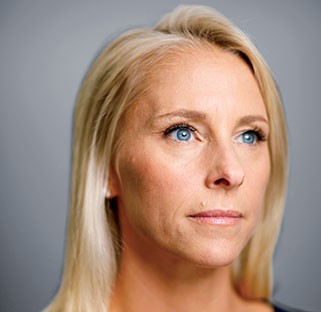Zoetis’ Plan for Weathering the Next Downturn
After Pfizer announced plans to spin off its animal health business in 2012, many in the business world did not quite know what to make of the company. How would an animal medicines business succeed on its own outside of a large pharmaceutical parent? Investors had questions when Zoetis went public the following year.
“At the time, there was no animal health sector,” says Kristin Peck, executive vice president and group president, U.S. operations, business development and strategy at Zoetis. “We had to not only explain the story of the company, but the story of the industry.”
Today the numbers explain that story pretty well. Since the 2013 IPO, Zoetis shares have returned 292%, including dividends—a very rosy outcome for investors. But Zoetis’ leaders did not come by this success through happenstance. It took an adroit blend of culture-building around customer focus, innovation and risk management. This is the story of how a brand-new entrant to the Fortune 500—now the world’s largest manufacturer of medicine and vaccinations for livestock and pets—continued to grow throughout this decade, despite global turmoil and volatility in many countries’ agricultural sectors.
For Zoetis and Ms. Peck, product and market diversity is an engine of growth—as well as resilience. Building resiliency is all about optionality, says Ms. Peck: Planning for multiple scenarios allows the company to quickly seize opportunities and avoid roadblocks, and develop the financial and operational flexibility to weather any downturn.
“We thought we would be dealing with the frustration that came out of the spinoff, but it turned out there was a lot more we could do. We had to listen to customers at a deep level.
—Kristin Peck, executive vice president and group president, U.S. operations, business development and strategy, Zoetis
Beyond a Rounding Error
The name Zoetis is derived from the Greek word meaning “pertaining to life”—fitting not only for a drug company that serves eight species of animals, from cats and dogs to poultry and pigs, but also for one with a growth trajectory unlike many others. At $5.8 billion, today Zoetis operates in 100 countries and offers 300 product lines including Simparica (a flea medication), Clavamox (an antibiotic for cats and dogs) and ProHeart (a heartworm medication).
But at the start of this decade, Zoetis was little more than a rounding error for Pfizer, the world’s largest drugmaker. Under its umbrella, Zoetis grew by afterthought. Then in the early 2010s, Pfizer turned its strategy to cost-cutting efficiency, while Zoetis remained focused on top-line growth. A parting of the ways made sense, especially since Pfizer was shedding other subsidiaries.
The complex undertaking involved separating manufacturing plants, supply chains and convincing 10,000 employees to take the risk of joining a new company. “Being part of Pfizer meant security,” says Ms. Peck, who at the time of the spinoff was an executive vice president at Pfizer.
“We’re in an industry where an epidemic or weather changes can have a dramatic impact.”
—Kristin Peck
Just nine months after going its own way, Zoetis launched a $2.2 billion IPO, the largest for a U.S. company since Facebook’s in 2012. Yet amid the lofty expectations, Zoetis was facing real challenges: The company raced to extricate itself from Pfizer’s enterprise resource planning (ERP) software system in just 24 months, creating shipping and billing problems that left some customers frustrated and angry.
Ms. Peck had been part of the leadership team that oversaw the spinoff and IPO. Afterward, she took charge of Zoetis’ U.S. business. She saw the customer frustrations from the ERP switchover as “an opportunity for the company’s leadership to step up.”
Ms. Peck instructed her sales colleagues to give any upset customer her direct line. When the calls came, she apologized for the problems and asked if customers had feedback on how the company was doing. She found that the transition was only part of the story. Customers were also unhappy with many of the company’s practices.
For instance, office managers at veterinarian offices complained that they were unable to pay online—just an example of the issues Zoetis had inherited from Pfizer. The huge drugmaker worked through major distributors, so things like online billing were not necessary.
Ms. Peck could have ignored the complaints. Zoetis may have been a new company, but it dominated its niche. With robust sales and profit margins delighting analysts and stockholders, it would have been easy to keep doing what had worked so well. But Ms. Peck saw big opportunities in change.
“We thought we would be dealing with the frustration that came out of the spinoff, but it turned out there was a lot more we could do,” she says. “We had to listen to customers at a deep level and change our perspective.”
Out in the Field
Zoetis began building a new culture focused on innovation and a heightened customer experience. Ms. Peck turned to her past experience as a business consultant working with companies in many industries. In that role, she saw the importance of culture in implementing change.
“Great leadership isn’t about having the best idea or being the smartest person. It’s about helping an organization rally around change, embrace it and act on it Share on X,” she says. “And that requires trust, to convince someone to do something radically different than they did the day before. At companies that are formal and bureaucratic, it’s hard to make change happen.”
She knew that one of the first things they would have to change was the company’s relationship with its customers. Realizing Zoetis was not an “expert in game-changing customer experiences,” Ms. Peck hired an executive from Citigroup to head that effort.
They discovered some customers were experiencing alarming issues, like shipments being delivered too early—a nightmare when a major poultry operation, for example, did not have its crew and storage space ready to receive its cold-stored medicine. Zoetis changed its delivery metrics as it embraced the mantra of becoming “customer-obsessed.”
But this was not just an example of tuning the shipping logistics. It demonstrated the importance of creating a mindset around the company that anticipates changing customer needs. “What the customer needs from us today may be different than what they needed yesterday,” Ms. Peck says. “We needed colleagues to become more entrepreneurial and look at challenges as opportunities.”
One step Ms. Peck took was launching a leadership development and mentorship program in the U.S. The program allowed employees to try projects in new sectors—a salesperson who worked with products for dogs might experiment with products for cattle to get outside their comfort zone. All the while, Ms. Peck kept an eye out for her favorite kind of employees—“frustrated optimists”—people who had great ideas but were not able to pursue them in the more bureaucratic Pfizer environment.
“I spent a lot of the first year out in the field learning,” she says. “One of the advantages of having a background in strategic consulting is knowing what an outside perspective could bring. Dumb questions can bring new insights.”
The desire to evolve has led Zoetis to break ground in many areas. It developed a pipeline of monoclonal antibodies to treat pain in dogs. “People never thought we could get monoclonal antibodies at the right price point for pets, but we did,” she says.
Zoetis recently opened an R&D lab at Colorado State University that will focus on understanding and developing immunotherapy for livestock. The hope is to avoid the use and abuse of antibiotics—a practice that many scientists believe promotes antibiotic-resistant bacteria.
This idea, too, came from listening to customers. In both the livestock and pet arenas, customers have expressed interest in using fewer resources and focusing on “well care”—preventing animals from getting sick, rather than just treating illnesses. Ms. Peck says it is important not to fight the customers’ desire to use fewer antibiotics, which might be in the company’s short-term interest. It is imperative that Zoetis jump into the forefront of the next big thing.
It is doing this with one of its latest products, Smartbow, an intelligent ear tag that collects all sorts of information about a cow’s behavior, such as whether it is eating or resting. Farmers will receive an alert on their device if an animal is getting sick, allowing them to separate it from the herd before it infects other animals. While such herd monitoring software is nascent, Ms. Peck says that the smart tag niche could become a major source of future revenue.
“Great leadership isn’t about having the best idea or being the smartest person. It’s about helping an organization rally around change, embrace it and act on it. And that requires trust.”
—Kristin Peck
Balancing Risk
Companies focused on making drugs for humans are all about home run products. But Zoetis’ approach stands in stark contrast. “In animal health, singles and doubles make a big difference,” she says. “If we can develop an antibiotic that can be delivered in one injection rather than two, that matters to our customers.”
The company’s portfolio is a mix of blockbuster brands, acquisitions and new products. Analysts say the company has deftly maximized returns in each area. Innovation brings risk, of course, so Zoetis develops resilience through balance.
Ms. Peck looks at balance on many levels. She wants the proper balance between products for pets and livestock. (Currently, 54% of Zoetis revenues come from products for farm animals, and 45% from products for pets.) She also wants balance among products in the eight different species it serves, as well as different markets around the world.
“We’re in an industry where an epidemic or weather changes can have a dramatic impact,” she says. “African swine fever has caused China to lose 30 to 40% of its pig herd.”
Despite this kind of volatility, one advantage that Zoetis has is the fact that animal health is a resilient industry. The global economy stalled back in 2008 and 2009, for example, but the sector continued growing at 3% in 2009. Drivers of the sector tend to be population growth, growing middle classes (members of which own pets) and urbanization.
Still, Ms. Peck is not taking any chances when it comes to a downturn. She sees the company’s diversity of products and geographies as protection against a recession—along with its deep commitment to innovation and customers.
A company focused on innovation and growth insulates itself from sudden contractions, she says. Developing close relationships with customers is another protective measure. Zoetis looks for ways to support customers during difficult times, such as when the U.S. cattle industry was devastated by drought.
“What makes us unique in this market is we are a trusted partner with our customers. Being a partner in times of stress separates the companies that perform well during a recession from those that don’t.” And that helps animals, customers and Zoetis alike stay healthy.
This article appeared in the Fall 2019 issue of Insigniam Quarterly, with the headline “Growth in Balance.” To begin receiving IQ, go here.




